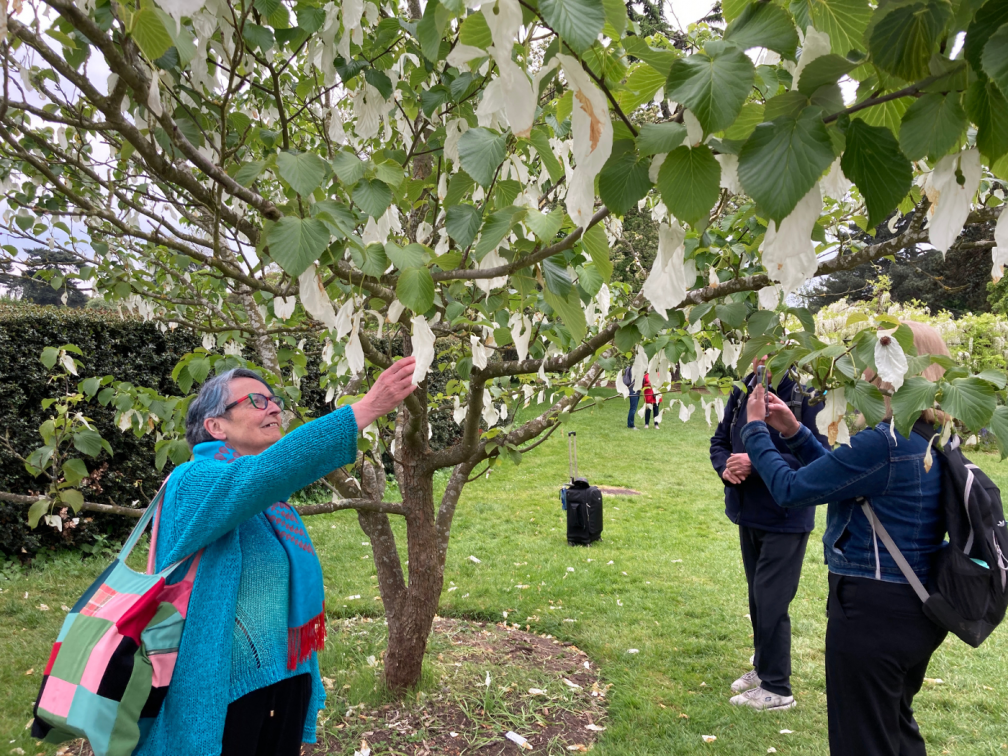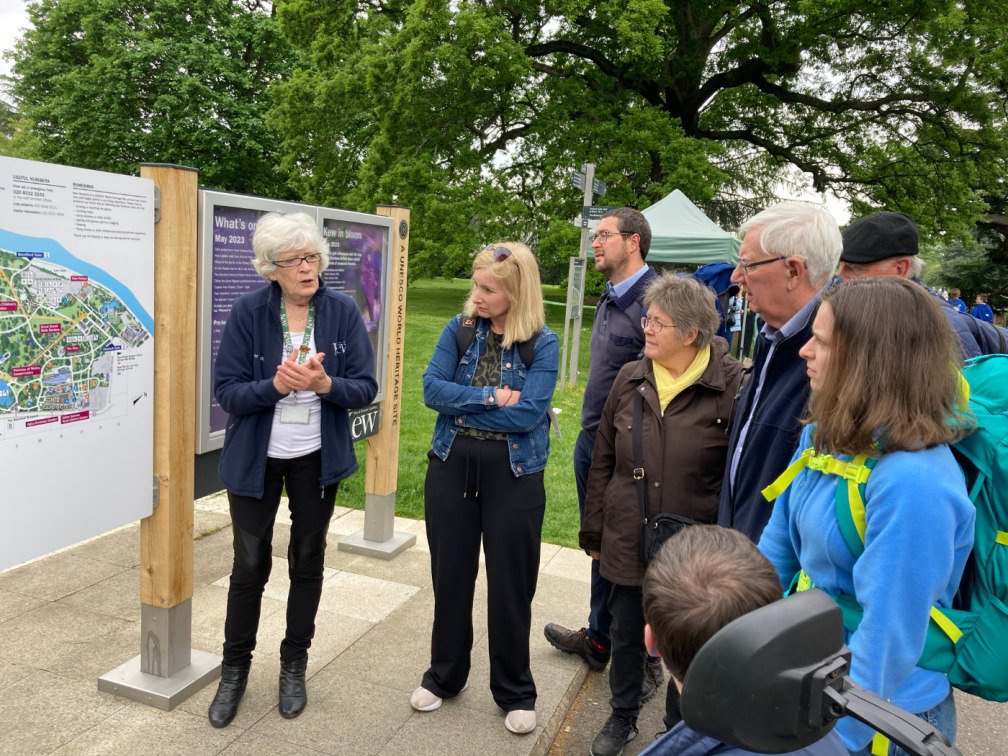To celebrate Laudato Si’ Week 21-28 May, and particularly UN Biodiversity Day on 22 May, James Trewby, the Columban Education Worker, organised for a small Columban group to visit Kew Gardens in West London on Monday. What a sensory feast it was…. and so informative.
We learnt that the 300-acre site has for three centuries been a haven for plants and wildlife. But its role today goes beyond this and it is a UNESCO World Heritage site. It is home to more than 50,000 living plants. We were told that Kew’s experts study the links between pollinators and plants. Very specifically, we learnt that bumblebee pollinators preferentially visit flowers with longer tubes, selecting for a funnel-shaped corolla, while butterflies prefer flat-headed plants. Also, under ultra-violet light, the humble yellow dandelion shows a red centre and a white exterior. Daisies take their name from the phrase “day’s eye,” because they open their petals at daybreak.
We marvelled at the ‘Handkerchief tree’, native to Chinam and the stunning lilac Sapphire Dragon tree from Taiwan. And our appreciation for the Oak tree was deepened when we stood around a Chestnut-leaved oak, more than 170 years old and 125 feet high, which hosts around 500 organisms. We enjoyed the colourful and fragrant plants bordering the Broad Walk – Allium, Lavender, and Achillea among them – which Kew offers as inspiration for visitors to take back to their gardens.
We heard from our wonderful volunteer guide, Valerie, that Kew is racing to save plants that are disappearing in the wild, mainly because of habitat destruction. The scientists and horticulturists here and at a second site, Wakehurst Place, work with partners around the world to use the ‘Living Collections’ for research and conservation to combat some of humanity’s most pressing issues. A Seed Bank facility at Wakehurst is available for research, re-introduction and restoration.
The Columbans help complement this mission by tackling habitat destruction. We campaign in the Amazon region to support indigenous peoples and their rainforest homes from logging and destructive mining and support the protection of biodiversity in Pakistan, Fiji, Chile and other countries.
After enjoying a packed lunch with some hungry geese, valuing the natural world was the theme of a time of reflection and prayer. We talked about #33 of Laudato Si’ where Pope Francis says: “Because of human activity, thousands of species will no longer give glory to God by their very existence, not convey their message to us. We have no such right.”
Biodiversity is life
The word ‘biodiversity’ was coined in the 1980s, at a time when human society was becoming more aware of the plight of rare mammals, such as tigers, and threats to tropical forests and coral reefs. It encompasses the full variety of genes, species and ecosystems on the planet. It includes the crops we eat and the insects that pollinate them; the bacteria that help create the soil that sustains farming; and the microscopic plankton at the base of food chains that end with fish on our dinner plates. It includes ecosystems such as forests that regulate water supplies and climate. Although rainforests cover only 6% of the land area in the world, they are habitat for at least half of the world’s species and they are crucial for the world’s water system. And indigenous people play a key role in such regions, protecting biodiversity.
Last year, the World Wide Fund for Nature UK, revealed that global wildlife populations have plummeted by 69% on average since 1970. The staggering rate of decline is a severe warning that the rich biodiversity that sustains all life on our planet is in crisis, putting every species at risk – including us. Our world’s most vulnerable people, places and wildlife – and those least responsible for the climate and nature crisis – are already suffering.
Half the calories we eat come from just three plants – rice, wheat and corn – but there are at least 30,000 edible plants. Biodiversity also serves as our medicine cabinet. More than half of commonly prescribed drugs are derived from natural products, while 60% of people in developing countries rely on traditional medicines – mostly plant-based – for their health care.
Faiths promoting all life
The environment encyclical of 2015, Laudato Si’, contained a chapter on Biodiversity. This was picked up in the document, ‘The Wailing of God’s Creatures’, commissioned to the Laudato Si’ Research Institute by Catholic organisations CIDSE, CAFOD, and the Global Catholic CIimate Movement. Creation theologian Elizabeth Johnson said this week: “Since religious traditions at their best are bearers of wisdom about ultimate meaning and lay out a roadmap for how to live a good life, most of the world’s religions have resources that can nurture ecological care.”
Columban workers in the United States attended the UN Convention COP15 in Canada last December. The UN Convention on Biological Diversity legally binds nation signatories to conserve biological resources, use them sustainably, and share the benefits arising from their use fairly. But it is currently poorly implemented. Columbans have also produced two podcast mini-series about the beauty of biodiversity and the threats it faces. The study guide and embedded video links are available on Columban websites. People of faith are increasingly involved in building a movement to care for our common home.
Later this week, Columban missionaries are continuing to celebrate Laudato Si’ Week by following in the footsteps of St. Columban and walking part of the Columban Way in Cornwall. Ordained and lay Columban missionaries and co-workers, led by Director in Britain, Fr. John Boles, will walk from Padstow to Fowey from 24-27 May. They are partnering with St. Mary’s parish and primary school in Bodmin and Plymouth diocesan representatives from CAFOD, Caritas and the Youth Ministry.


